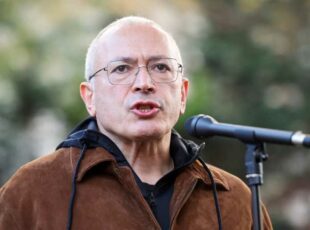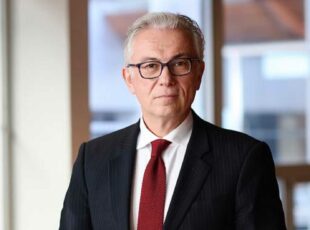Arm Ukraine now or face war on NATO territory, Khodorkovsky warns
If NATO does not seize its historic opportunity to stop Vladimir Putin in his tracks, it will face war on its own territory, long-time Kremlin opponent Mikhail Khodorkovsky has told Euronews.
“Today, NATO has a great opportunity to help Ukraine defend its sovereignty by participating in this war with weapons, supplies and training Ukrainian soldiers, rather than fighting on its own territories,” Khodorkovsky told Shona Murray in the Global Conversation. “If this opportunity is missed, I issue a warning: in a few years, or perhaps even earlier, NATO will be directly involved in this war, because it will be happening on the territory of a NATO country.”
Oligarch Khodorkovsky was once Russia’s richest man, before falling foul of Putin and spending ten years in jail for tax evasion, embezzlement and fraud. He now lives in exile.
Interview in full:
Shona Murray: For a significant while in your life you knew Vladimir Putin well. What do you think he’s thinking right now and how far can he go with this war?
Mikhail Khodorkovsky: What I see on his part today is a mixture of pragmatism, that is, a desire to strengthen his electoral rating and an emotional response – I mean a kind of paranoid fear of what is happening in the neighbouring country, fear of democratic transformation, the independence that Ukraine has gained.
SM: But at the same time, we saw his incursion in 2008, his takeover of Crimea in 2014. Do you believe that they’re separate to this war now or that the war now is triggered, as you said, from COVID and from other issues? Is that what you’re saying?
MK: Putin has solved his electoral problems through war four times during his presidency. The first time was ’99. Then it was indeed 2008, 2014, and now 2022. The COVID isolation helped form his idea that Ukraine would not resist, that he wouldn’t meet any organized resistance there, that some cities might perhaps cheer him with flowers!
Putin’s “gangster” mentality
SM: It’s Putin’s failure, you say. But is it also the West’s failure? Given what we’ve seen about Vladimir Putin in the last two decades, we’ve seen him try to take over Crimea, his interference in Syria and so on. Was the West naive to what Putin would eventually do?
MK: Leaders of major European countries still believe that it is possible to agree on something with Putin without showing him their strength, that is – from being in a weak position, from Putin’s perspective. And this is a dramatic mistake, because they’re not talking to a leader who’s like them. No, they’re talking to a gangster. And any gangster who thinks they are in a position of strength and who is being asked to make concessions will in fact try to finish off his victim.
SM: So what is the solution in your regard? Obviously, I think at this point maybe Emmanuel Macron and others are learning not to try to negotiate with Putin. What would you suggest they do to end this situation?
MK: You know, quite recently, probably a month ago, I was surprised by Mr. Borrell. He’s a European official and I never expected harsh words from him. But he said the right thing – this conflict will be resolved not at the negotiating table, but on the battlefield. Later on, of course, there will be negotiations and in the end the war will be stopped with negotiations. But the very first solution is going to be on the battlefield. There’s no alternative!
SM: And what does that include? Does that ensue NATO getting officially or formally involved in Ukraine? Is that what you’re you think is the only solution here? Otherwise, the war will continue or spread. What do you think?
MK: Today, NATO has a great opportunity to help Ukraine defend its sovereignty by participating in this war with weapons, supplies and training Ukrainian soldiers, rather than fighting on its own territories. If this opportunity is missed, I issue a warning: in a few years, or perhaps even earlier, NATO will be directly involved in this war, because it will be happening on the territory of a NATO country. Those who believe you can somehow reach agreement with an aggressor are repeating the mistakes of their many predecessors. Tens of millions of Europeans have already paid for these mistakes with their lives some 70 years ago.
Sanctions can’t stop aggression
SM: How would you assess the situation in terms of how NATO has performed? How NATO member states have performed? We’ve often seen some wrangling in Germany about German arms going to initially as well as going to Ukraine. Do you think efforts need to be stepped up significantly or are we on the right track in terms of military support for Ukraine?
MK: I am convinced sanctions could have mattered in 2014. Now sanctions can’t stop the aggression, although they can weaken the regime so this aggression doesn’t get reproduced for some time. But now the issue is being resolved on the battlefield. If NATO wants it to be resolved on the territory of Ukraine, then, of course, it needs to provide much more systematic support. It makes me laugh to hear some officials saying: if we give Ukraine an additional five, ten or twenty guns, it will be able to go and fight on Russian territory! What are you talking about? Today the artillery capability of Putin’s army exceeds Ukraine’s by 20 times! 20 times! Putin’s aerial domination is total.
Re-constructing Russia after Putin
SM: Just a final question, you’ve said before that this war will lead to Vladimir Putin’s demise. And the war itself has touched you personally because of your family history in Ukraine – your grandmother, your time spent there in childhood. If we see the end to Vladimir Putin’s administration, can you see yourself returning to Russia as part of the rebuild politically, as a political figure?
MK: I’m not a politician by nature. I’ve always enjoyed doing business. And after prison, where I spent 10 years, I prefer… I am more interested in social activities. I don’t believe Russia should have this Tsar figure, who’s inherently searching for an external enemy. It is very important for post-Putin Russia to become a federal state and build a functional parliament that would represent the interests of the Russian regions. If at that stage – they will need my support as a manager, an administrator with relevant managerial experience, of course, I’ll try to help my country. If the younger generation can handle this, I’ll be very happy.
First published at Euronews



